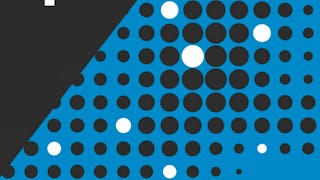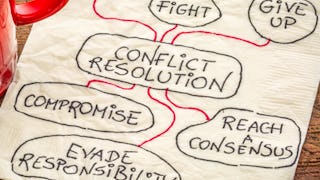Every workplace has conflict, but in the hands of a skilled professional, it becomes a powerful tool for growth. Disagreements can spark fresh ideas, strengthen relationships, and improve teamwork—if you know how to manage them well. This course shows you exactly how.


您将学到什么
Spot early signs of conflict before they escalate
Apply proven techniques to resolve disputes quickly
Keep relationships strong even in disagreement
Turn conflicts into opportunities for better collaboration
您将获得的技能
要了解的详细信息

添加到您的领英档案
June 2025
8 项作业
了解顶级公司的员工如何掌握热门技能

积累特定领域的专业知识
- 向行业专家学习新概念
- 获得对主题或工具的基础理解
- 通过实践项目培养工作相关技能
- 获得可共享的职业证书

该课程共有2个模块
This module introduces the foundations of workplace conflict, its causes, and the critical role leadership plays in conflict prevention. Learners will explore practical approaches to identifying, understanding, and managing conflict effectively in professional settings.
涵盖的内容
8个视频4个作业
This module delves into the psychology of conflict escalation and de-escalation, offering proven models and emotional intelligence strategies. Learners will gain practical tools and communication techniques to resolve conflicts constructively and confidently.
涵盖的内容
13个视频4个作业
获得职业证书
将此证书添加到您的 LinkedIn 个人资料、简历或履历中。在社交媒体和绩效考核中分享。
位教师

提供方
从 Leadership and Management 浏览更多内容
 状态:免费试用
状态:免费试用Packt
 状态:免费试用
状态:免费试用 状态:预览
状态:预览Starweaver
 状态:免费试用
状态:免费试用University of California, Irvine
人们为什么选择 Coursera 来帮助自己实现职业发展




常见问题
To successfully settle conflicts, conflict management involves figuring out what starts the conflicts, what makes people feel bad, how to communicate and get feedback, and using structured models like Thomas-Kilmann or Glasl's model.
This Conflict Management training is designed for working professionals at all career levels who wish to improve their confidence, clarity, and communication skills in order to handle and resolve workplace issues effectively.
You'll be prepared to detect emotional triggers, de-escalate stressful situations, use models such as the Conflict Iceberg, Glasl's Escalation Model, and Thomas-Kilmann Conflict Model, and direct disagreements toward constructive settlement.
更多问题
提供助学金,



